- Home
- Sarah Hawkswood
Ordeal by Fire Page 5
Ordeal by Fire Read online
Page 5
Bradecote had no real idea if the solution was practicable, but was keen to give the carpenter’s wife some hope while she was alone. He wanted her calm enough to give him fair answers, for a motive for the fire had occurred to him. A bench stood outside the besom maker’s frontage, and he guided her to it and sat down beside her. Catchpoll caught his eye, and went to speak with the labourers, who had resumed their work now that the excitement was over.
‘Has Mercet made any suggestion or threat to you about your tenancy before this?’
Bradecote was reluctant to use ‘threat’ but was not sure if anything less would gain a response. He was disappointed, however, because Mistress Woodman clearly knew nothing. All matters of business were conducted with her husband, she said, and she had never had speech with Master Mercet or any of his hirelings until today. She cast the undersheriff a nervous look, fearful of displeasing him, and trembled at the grim set of his mouth. It was not her answer that had made him so, but the manner, which had been so reminiscent of Ela that he almost caught his breath.
Despite the unsatisfactory response from the carpenter’s wife, Bradecote was keen to investigate the possible involvement of the unseen but malevolent Mercet. He thanked the woman, reminded her to tell her spouse about the priory, and crossed to where Catchpoll was in apparently light-hearted conversation with the labourers.
Bradecote had seen Catchpoll at this ploy before, and knew how effective it could be in eliciting information. He was not surprised, therefore, to catch the meaningful twinkle in the serjeant’s eye. Catchpoll disengaged himself gently from the conversation and left the men to their work.
‘I take it you have ferreted out something interesting, Catchpoll.’
‘Possibly, my lord. I say no more than that at present, but it may prove useful.’
‘I, too, but I’ve no wish to discuss matters in the street. Should we return to the castle? I fear being trapped by the castellan.’
Catchpoll made a deprecating noise in his throat. ‘You could come to my place, my lord. The wife will leave well alone and we can talk as long as we like.’ He did not appear pleased at the thought, but had as little desire to be distracted by the lord Furnaux.
‘Thank you, Catchpoll. That might be a very good idea.’
The pair walked in amicable silence through the streets of Worcester, parting like the current round rocks past the busy folk about their business in the town, caught up in their own cogitations and ignoring the bustle of the populace.
At last they sat at the bench table in Catchpoll’s little cott. It was dark within, and motes of dust cavorted playfully in the shaft of sunlight that came through the open doorway. Mistress Catchpoll had been torn between anger at her husband bringing gentry to her hearth without warning, and delight at what she would be able to tell her cronies about her illustrious visitor. She kept out of the way, as Catchpoll had said, but only out of earshot, not view.
The two men settled themselves with a jug of ale and Bradecote set out his discoveries first. Catchpoll agreed that Mercet was worth watching and speaking to about the fire in Corviserstrete, but threw up the problem that the silversmith owned his own property.
‘But did he perhaps buy the premises from Mercet and Mercet now regrets the sale or the price?’
Catchpoll scratched his grizzled cheek ruminatively. ‘That might be so, but would be difficult to prove.’
‘But if it had been his, then he, or more likely his man Turgis, would know the layout of the rear chamber well enough.’ Bradecote was reluctant to let his theory drop.
‘Fair enough, my lord. We should pay Master Mercet a visit, I’m thinking. Even if he wasn’t involved in the fire, his activities since warrant our attention. It would be good to let him know that we know what he is about. But you are not the only one with a trail to follow.’ Catchpoll halted, tantalisingly, but Bradecote only smiled drily, and forbore to look interested. Catchpoll shrugged and continued.
‘The men clearing what had been the glover’s shop told me about the old woman, the Widow Edgyth. It seems she had quite a reputation, not that I knew much of her. Some people were afraid of her, said she was a witch, but she certainly made balms and potions for the sick. What is even more interesting is that she was a woman visited by young women who found themselves with child and wished they were not. The men said it was common knowledge that she brewed draughts that would make a woman miscarry.’
Bradecote was frowning. ‘So you think the object of the fire was to rid the world of Old Edgyth … a jealous leech or an angry man who wanted to be a father?’
‘Unlikely to be the latter, my lord. Most men whose wenches seek to lose a babe are either married already or likely to be assaulted by the girl’s kin for their lustfulness. No, what occurs to me is the connection between the two fires.’ He saw Bradecote’s perplexity and grinned; a death’s head, mirthless grin. It was good to be ahead of his superior. This time the undersheriff did react.
‘Come on, Serjeant. Don’t play with me.’
‘Well, my lord, when I was first at the silversmith’s an old woman let loose the information that Edwin the journeyman’s girl was with child. It wasn’t something any man could tell, I assure you, and it caused quite a stir. I wonder if it was this Old Edgyth. When I saw the body, well, her kin would not have recognised the remains. The girl, Winflaed, might have thought to rid herself of the child and then changed her mind, or had Edwin change it for her.’
‘What you are saying is that the motive would be that the girl or her lover wanted revenge upon the old woman for letting their secret into the open. It sounds rather thin, unless the girl has been cast out and Edwin punished.’
‘That’s not the case, though the girl’s father was far from pleased.’ There was a pause while Catchpoll sorted his thoughts. ‘If the old woman had given the girl the opportunity to get rid of the child and Edwin had been firmly against it, he might well be angry with the person who had been willing to help.’
‘But angry enough to set a fire? And what reason was there for the first fire if Edwin and Master Ash get on well?’
‘There’s the rub, I’ll grant you, my lord, but perhaps there’s undercurrents we don’t yet know about. All I am saying is we have a connection, and that’s more than we had an hour or so ago.’
Bradecote sighed and rubbed his chin thoughtfully.
‘The body you found in the widow’s dwelling was Old Edgyth? I mean, it might have been—’
Catchpoll raised a hand and interrupted. ‘I’d swear it was so. The corpse was not recognisable except as human, but the size was right and the teeth showed clearly. Neither the widow nor the body had many teeth. The glover attested to that. The old crone I saw by the silversmith’s also lacked teeth. If it was a different person it would have to be an extraordinary coincidence. And the woman has not been seen since.’
‘Could the fire have been accidental?’
‘Not if it started in the wood store, as Father Boniface said.’
‘Who is Father Boniface?’
‘The priest at St Andrew’s. He said he raised the alarm, and that was because he saw the fire in the wood store.’
The younger man steepled his fingers together and stared at them for a minute or so. Catchpoll’s wife set a fresh loaf, a heel of cheese and a platter of warm oatcakes before them and withdrew silently. The serjeant pushed them towards Bradecote, but the undersheriff was too lost in his thoughts to take notice. Catchpoll cut himself some cheese and a hunk of bread and began to eat, unhurriedly.
Eventually Bradecote roused himself and slapped his hands on the table.
‘We have a lot to do, Catchpoll, though I do not know if it will advance our investigation. So much seems to be proving what did not happen and who did not do it. Have we much chance on this one, do you think?’
‘Couldn’t say, my lord. But the lord sheriff will be mightily aggrieved if he returns to find Worcester in uproar, and bits of it smouldering, so we had best hope we’re l
ucky.’
Bradecote groaned, and Catchpoll grinned, proffering the food again. ‘Eat up, my lord, and you’ll work better on a full belly.’
Mistress Catchpoll was later able to tell her intimates that her noble visitor had complimented her on her baking, especially the oatcakes.
Chapter Five
After their repast, the sheriff’s men split up; Catchpoll departed to find out what he could about Edwin and Winflaed, and Bradecote went to seek out the priest of St Andrew’s. They agreed to meet again later, and pay a visit upon Robert Mercet.
Bradecote had little trouble in finding St Andrew’s Church, but the incumbent was more difficult to track down. The church itself was cool and empty, and the advice of a woman passing by with a basket of washing, which was to knock at the door of the small adjacent dwelling, proved equally fruitless. The undersheriff had no wish to be idle, but he was also keen to have Catchpoll present when he spoke to Mercet. He sighed, and went back into the church. He was surprised to see a dark-habited figure trimming a candle.
‘Father Boniface?’ Bradecote’s tone was uncertain.
The cleric turned. ‘Yes.’
There was no welcome in the voice, nor softening of the austere features. Here, thought Bradecote, was a man who would not show much understanding of the errors of his flock. He was quite young, perhaps only in his late twenties, but the stern demeanour aged him. He was tall, almost gangly, and the robe hung from him as though his body were the clapper in a bell. The ring of hair about his tonsure was very dark, and showed a tendency to wave, but looked as though such frivolity was frequently chastised by water and comb. The dark brows beetled over a finely chiselled face with hard grey eyes. Bradecote felt that pleasure of any sort was anathema to the man.
‘I am sorry, Father. I was here only a few minutes ago and could not find you. I tried your house also.’ Bradecote wondered why he was apologising to the man.
‘I came in through the sacristy door. How may I help you?’
‘I am Hugh Bradecote, the undersheriff. I wish to speak to you about the fire in Corviserstrete the other night. You raised the alarm, it seems.’
The priest nodded.
‘Yes. Heaven be praised that I was there! It is not the usual route I would have taken, but I had been considering a difficult problem, and, you know, I find walking is beneficial. My steps must have been guided.’ He shook his head. ‘I am glad that so many were spared, but, dear me, the old widow woman must have been hard of hearing or sound asleep, and in the bustle was forgotten. She died unshriven, and in the midst of her sin. It will go harshly against her.’
Bradecote was shocked by the stern edge to the priest’s last words.
‘Surely an old woman would have little left to confess?’ He tried to sound cheering.
Father Boniface stared at him stonily. ‘Assuming she had confessed all the earlier sins of her life, and not hidden them in her shame. The depths of iniquity suck many into it, and damnation is eternal.’
‘Yes, well …’ Bradecote had no desire to be given a lesson on the price of sin. He looked uncomfortable. A silence hung in the air until the priest broke it.
‘What is it that you hoped to learn from me?’ Father Boniface enquired.
Bradecote reassembled his thoughts. ‘Only to find out where you saw the fire first of all, and whether you saw anybody else about beforehand.’
The priest clasped his fingers together, and thought for a moment.
‘I certainly saw the fire in the wood store, and I think, yes, it may have already enveloped the dwelling next to it on the one side, but was only just spreading to the carpenter’s house at that time. It must have begun in the yard on the furthest side from the house. Once the alarm was raised so much happened all at once. Alas, fire is a most crafty enemy that can move swiftly, and yet with furtiveness. It could have already been smouldering ready to take other lives even as I saw it. We were fortunate that no other souls were lost.’
‘And did you see anyone else before you cried out?’
Father Boniface shook his head. ‘I was not concentrating on where I was walking, you must understand, so it is possible that someone could have stepped into the shadows and slipped past me, but I saw nobody.’
‘I think you should be more wary if you walk in the dark, Father. Not all the citizens of Worcester are honest.’
Father Boniface gave a tight smile. ‘Those that are less honest would also know that a priest would have nothing worth stealing.’ He held open his arms. ‘Would they steal habit and rope girdle?’
He had a point, acknowledged Bradecote. There seemed little more to be gained from the man, so Bradecote thanked him and withdrew.
Out in the open, he took a great gulp of air, though it was not as fresh as the country air he preferred. The cleric’s manner had been oppressive to the spirit, like a heavy black rain cloud. Bradecote headed for his appointed rendezvous with Catchpoll, hoping the serjeant had spent a more profitable hour, but when he espied him there was nothing in his demeanour to suggest he was bursting with news.
Serjeant Catchpoll had made the same assessment as his superior, and was caught between a feeling of pleasure that the undersheriff had not made some astounding discovery alone, and the weary recognition that there was an awful lot more work to be done.
‘So we can’t return to the castle crowing of our success like midden cocks, my lord,’ he concluded at the end of his report. He had tried the besom maker next to the Widow Edgyth’s dwelling, but the man had been little use. He had seen a fair number of young women tap at the old woman’s door, but then he had seen an equal number of men, young and old, and children too, with eggs or such to pay for the widow’s remedies. Catchpoll had described Winflaed, but the man had shaken his head. Fair maids, dark maids, fallen maids or old maids, he had not the time nor indeed the inclination to gawp at his neighbour’s visitors.
‘And have you tried around the silversmith’s?’
Catchpoll frowned. ‘Of course, my lord. Do you take me for a bumblehead?’ The question was clearly rhetorical. ‘A woman who lives opposite the fletcher was happy enough to tell me about the arguments she’s heard between Winflaed and her father, and says she thought the silversmith’s journeyman was smitten with the girl, but nothing more. Master Ash and Edwin have nary a cross word, it seems, and master treats journeyman like a favoured son, so there is no sensible motive for Edwin to start a fire, or rather get Winflaed to do it for him since he was with Master Ash when the fire was noticed. I asked the woman if she knew the old widow, and if she had seen Winflaed or her swain seeking her balms, but that meant nothing to her, I swear.’
‘And I have nothing wondrous to report from Father Boniface, other than I am heartily glad not to be one of his parishioners. They must pay heavy penance for their sins in that church, I tell you. But the priest could not say he saw anyone when the fire sprang up, nor if the wood store was actually the source of the fire.’
‘Then I suggest we get on and cheer ourselves with a visit to Master Mercet, my lord.’
‘Cheer ourselves?’ Hugh Bradecote raised a mobile eyebrow.
‘Indeed. He’ll make you want to commit an act of violence upon him, on behalf of the good folk of Worcester, but we should be able to put paid to some of his plans, and that is almost as good.’ Catchpoll’s eyes glittered at the thought, and his death’s head smile grew.
Mercet’s house stood on a fine burgage plot amidst those of Worcester’s wealthiest citizenry. The door was opened by a serving man whose demeanour was that of one keen to keep visitors out rather than usher them in. His gaze bypassed Bradecote entirely, as his eyes alighted on Catchpoll. They narrowed instantly, and he made to shut the door in their faces, but the serjeant stepped smartly forward, unceremoniously barging past his superior and keeping the door open by foot and hand. He smiled, which made the minion look even less comfortable.
‘Good day to you, Serlo. We was wondering if we might be favoured with a few minutes of M
aster Mercet’s so very valuable time.’ The tone was soft, and had it not been for an undertone of pure menace, almost apologetic. Serlo, not bright enough to read the signs, grinned.
‘My master is not seeing folk this afternoon. He is busy.’
‘Ah yes. So many pies to stick his filthy fingers into; so many widows and orphans to cast into the streets, eh? Well,’ Catchpoll paused and thrust his face forward into Serlo’s, ‘I think you did not understand. When I said “we wondered”, I really meant “we will”. Now run along like the faithful cur you are, and tell him the lord Undersheriff of Worcester and his old friend Serjeant Catchpoll are coming in for a little visit.’
Serlo rolled his eyes, caught between the knowledge that his master would be mightily displeased, and the growing fear that Catchpoll would do something unspecified but extremely painful. The latter prevailed. He bolted back down the gloomy passageway, and the sheriff’s men followed, not waiting for a response.
‘You have a way with words, Serjeant,’ remarked Bradecote, with the ghost of a smile.
‘Indeed, my lord, and it is closely linked to my ability to throttle the breath from vermin like Mercet and his underlings, given half the chance.’ Catchpoll grinned, and was still grinning when they stood before Robert Mercet in his hall. He was a well-dressed, plump man, with noticeably pudgy hands, incongruously angel-fair wavy hair, and eyes that were both calculating and unusually pale blue. He was sat at a table with a harassed clerk, and they were clearly engaged upon accounts, because a chequered cloth piled with counters lay before them.
He looked at Catchpoll and Bradecote, annoyance vying with a desire to appear unconcerned at the intrusion.
‘So you are the new undersheriff, my lord. Now what was it the last one died of, the flux or the pox?’ The voice matched Catchpoll’s for quiet menace, and the accompanying smile accentuated the insult.
Catchpoll said nothing, but Bradecote sensed him tensing. The undersheriff simply ignored the question.

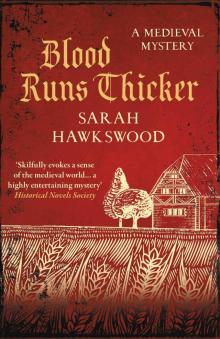 Blood Runs Thicker
Blood Runs Thicker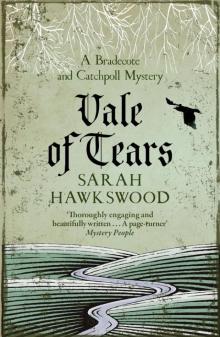 Vale of Tears
Vale of Tears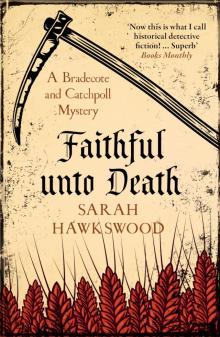 Faithful Unto Death
Faithful Unto Death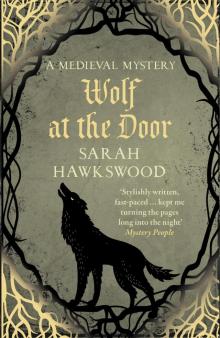 Wolf at the Door
Wolf at the Door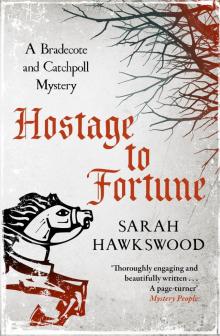 Hostage to Fortune
Hostage to Fortune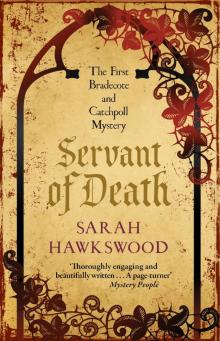 Servant of Death
Servant of Death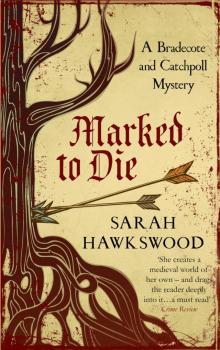 Marked to Die
Marked to Die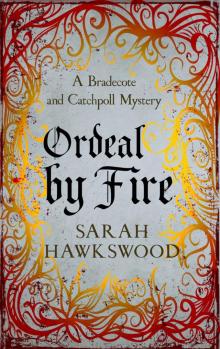 Ordeal by Fire
Ordeal by Fire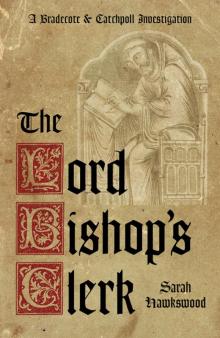 The Lord Bishop's Clerk
The Lord Bishop's Clerk